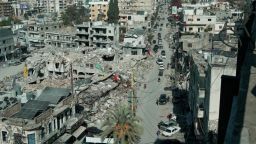CNN
—
For the first time since a ceasefire went into effect last week, Hezbollah has fired two projectiles toward Israeli-occupied territory, responding to repeated Israeli strikes since the agreement.
Israel has carried out daily strikes in Lebanon since Thursday, the day after a ceasefire went into effect. One person was killed in a strike in southern Lebanon, according to the Lebanese Ministry of Health.
On Monday, Hezbollah fired two projectiles, which landed in an open area, according to the Israeli military, which said no one was injured. The military did not specify the type of projectile fired. Israeli Prime Minister Benjamin Netanyahu said in a statement that the attack was “a serious violation of the ceasefire” and that his country would “respond to this with force.”
The Israel Defense Forces (IDF) said on Monday that its own cross-border strikes, despite the ceasefire, had been “in response to several acts by Hezbollah in Lebanon that posed a threat to Israeli civilians, in violation of the understandings between Israel and Lebanon.” It said it had struck military vehicles at a Hezbollah missile manufacturing site in the Beqaa Valley and tunnels near the Syrian border in northern Lebanon.
Both the United States and French governments have warned Israel that they believe the Israeli military has violated the terms of the ceasefire, according to CNN affiliate Kan and Israeli news outlet Ynet.
A source with the United Nations peacekeeping force in Lebanon, UNIFIL, says Israel has breached its ceasefire agreement with Lebanon “approximately 100” times since the truce went into effect last week. CNN has asked the IDF for comment.
Israeli Foreign Minister Gideon Sa’ar told his French counterpart in a phone call that his country is, in fact, enforcing the ceasefire – which stipulates Hezbollah’s withdrawal from the Israel-Lebanon border area – rather than violating it, Sa’ar said on X on Monday.
“The presence of Hezbollah operatives south of (Lebanon’s) Litani is a fundamental violation of the agreement and they must move north,” Sa’ar said, adding that Israel is “committed to the successful implementation of the ceasefire understandings.”
Hezbollah, in a statement, said that it targeted Israeli military positions “in light of the repeated violations initiated by the Israeli enemy of the ceasefire agreement.” Hezbollah accused Israel of breaking the ceasefire by “firing on civilians and airstrikes in different parts of Lebanon, resulting in the martyrdom of citizens and injuries to others, in addition to the continued violation of Lebanese airspace by hostile Israeli aircraft reaching the capital, Beirut.”
The IDF said the two Hezbollah projectiles were fired toward Shebaa Farms, known in Israel as Har Dov (Mount Dov), which under international law is considered occupied Syrian territory. Israel seized Shebaa Farms, along with the Golan Heights, from Syria after it was attacked in 1967. The U.S. recognized Israel’s sovereignty over the Golan Heights in 2019.
Israel’s defense minister, Israel Katz, said in a statement that “Hezbollah’s firing at the IDF post in Mount Dov will be met with a harsh response. What was will not be.”
“Test hour,” said Benny Gantz, a former IDF chief of staff who left the government earlier this year. “If we don’t react strongly against the state of Lebanon, we will return to the era of equations.”
A shaky start
Both sides have, since the early hours of last week’s ceasefire, accused each other of violations, and the escalating tensions risk endangering the agreement altogether.
A senior Israeli official said Friday that the military intends to aggressively and unilaterally act against any ceasefire violations by Hezbollah.
Unilateral Israeli military action to enforce the ceasefire was not enshrined in the agreement between Israel and Lebanon, but the US provided Israel with a separate letter that provided assurances about Israel’s right to act under certain scenarios, Israeli officials told CNN earlier.
The ceasefire deal stipulates a 60-day cessation of hostilities, which negotiators have described as the foundation of a lasting truce. During that time, Hezbollah fighters are expected to retreat some 40 kilometers (25 miles) from the Israel-Lebanon border, while Israeli ground forces withdraw from Lebanese territory.
UN Security Council Resolution 1701, which ended the last all-out war between the two countries in 2006, has been the basis of the deal and the negotiations have mainly revolved around the treaty’s enforcement.
Under the agreement, Lebanon would implement a more rigorous supervision of Hezbollah’s movements south of the country’s Litani river, to prevent militants from regrouping there.
United Nations peacekeeping troops, the Lebanese military, and a multinational committee will be tasked with supervising the Iran-backed group’s movements.



